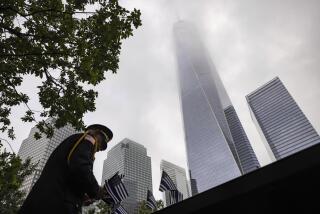Alert, and Remembering
- Share via
For 16 years until just the other day, all U.S. airline clerks were required to ask every air passenger two questions: “Has any stranger asked you to carry an item on this flight?” And “Have all your bags been under your immediate control since you packed them?”
Think about it. For 16 years we and our government thought that asking two questions at the airport counter could help foil hijackers. That such people or their unwitting accomplices would honestly have to turn themselves in right there and then. And our planes would be safer. Most of us replied “No” even before the rote questions were finished. Indeed, the 19 known hijacker terrorists of Sept. 11, 2001, no doubt said “No” too and were probably telling the truth before they wreaked mayhem with the airplanes themselves.
At dawn last Sept. 11, that verbal security check made sense. By lunch it was compelling evidence of the national naivete that also went up in smoke over the World Trade Center, the Pentagon’s west side and the soggy corner of a recovering strip mine in Pennsylvania.
In an earnest American way, we trusted in honesty and a belief in humanity. We got blindsided. That hurt badly. And now, here we are in the midst of a global war against terror, a massive security spending spree and a national orgy of remembering. We’re older, surely; a little wiser, probably; a tad more cynical or skeptical, perhaps. We’ve changed some habits--travel less, endure more inconvenience silently, cherish our families more consciously. When we leave for work, some may even flash back to those 9/11 victims who left home their last morning taking a safe return for granted.
As individuals and as a people, we’ve felt angry at times, even downright vindictive. Most of us can still feel puzzled, despite the vivid evidence, that so many elsewhere could actually, sincerely, viscerally hate us. What for? we ask in another naive, natural display.
We’re more wary as a nation too, thanks to natural caution and, in part, a developing penchant for “alerts” of all kinds. We’ve long had SigAlerts and ozone alerts. Now there’s a new panoply of alerts: national security alerts coded by color from red (severe risk of terrorist attacks) through orange, yellow, blue and green (low risk). Cable TV is fond now of news alerts, even if the news isn’t all that new. We have chemical alerts, energy alerts, Amber alerts, collision alerts, forest fire alerts, high alerts, low alerts and heightened alerts. We even have West Nile alerts about a little insect. Some days we could use an alert to sort through which alerts are important.
Not surprisingly, we’re less alert to alerts today. For a long while last fall, every airplane overhead drew concerned looks. The sight of tall buildings prompted spinal shudders. Pillars of smoke didn’t just mean fire. This is all part of coping, of the healing process, which moves through different people at different speeds in different ways. It’s natural for the pain to subside some. A year ago, many things we now recall vividly were then unthinkable.
How very much has changed. Today and in the months to come, as easy and as tempting as it will be to forget much, we need to be alert not to. Both as a tribute to those gone and as a perpetual warning to an America somewhat wiser about its vulnerability.
More to Read
Sign up for The Wild
We’ll help you find the best places to hike, bike and run, as well as the perfect silent spots for meditation and yoga.
You may occasionally receive promotional content from the Los Angeles Times.






